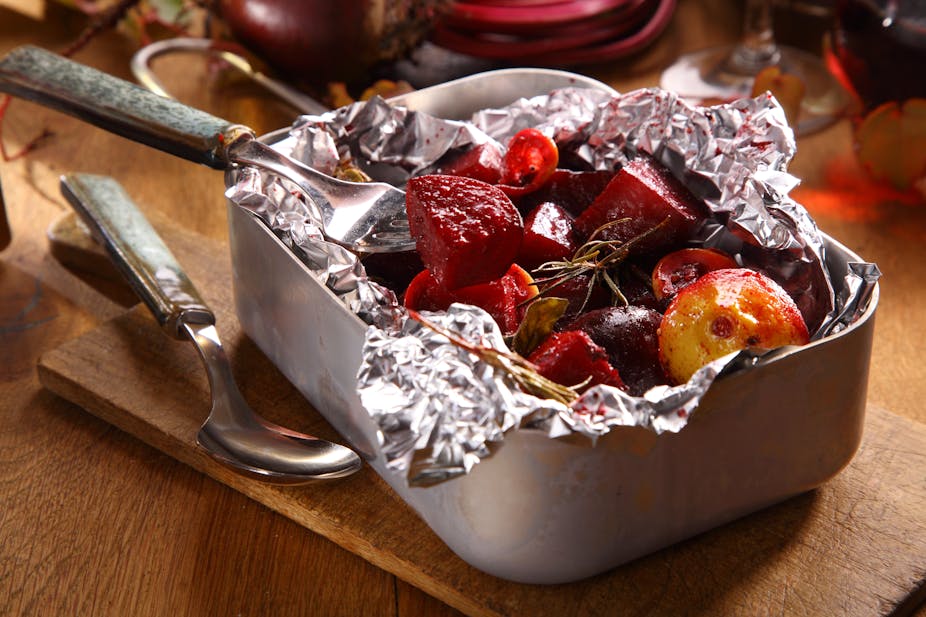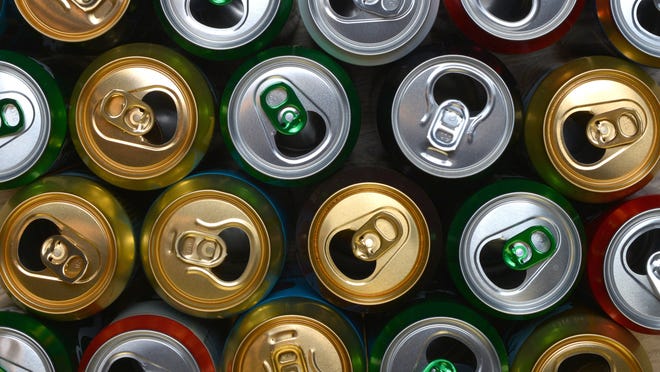Yes, aluminum can leach into food. This happens most often when cooking with aluminum foil or using aluminum cookware. When aluminum leaches into food, it can cause health problems.
Does aluminum foil leach into food while cooking?
If you cook with aluminum pans or foil, you may be concerned about the possibility of the metal leaching into your food. While it’s true that aluminum can leach into food, it’s not a cause for concern in most cases. The amount of aluminum that actually leaches into food is very small and unlikely to cause any harm.
Does Aluminum Leach into Food from Cans
When it comes to the safety of canned foods, one of the main concerns is whether or not aluminum can leach into the food. While it is true that aluminum cans are lined with a coating that helps to prevent this from happening, there is still some risk involved.
So, does aluminum leach into food from cans?
The answer is yes, but the amount that leaches into the food is very small and not likely to cause any harm. However, if you are concerned about this issue, there are some steps you can take to reduce your exposure even further.
One way to reduce your exposure to aluminum in canned foods is to choose brands that use BPA-free linings.
BPA stands for bisphenol A, and it is a chemical that has been linked to health problems like hormone disruption and cancer. While most brands have switched to using BPA-free linings in their cans, not all of them have done so. So be sure to check the labels before you buy.
Another way to reduce your exposure is to avoid heating up canned foods in the can itself. When food is heated, it causes the lining of the can to break down and release more aluminum into the food. Instead, transfer the contents of the can into a pot or pan before heating it up on the stovetop.
Is It Safe to Cook With Aluminum Foil
Cooking with aluminum foil can be safe, but it depends on the temperature and the type of food you’re cooking. If you use aluminum foil to cook chicken or fish at high temperatures, there is a risk of the aluminum leaching into the food. This is more likely to happen if the foil is in contact with the food for a long time or if it’s crumpled so that it has more surface area.
If you’re concerned about aluminum exposure, you can avoid using foil when cooking at high temperatures or choose to use parchment paper instead. Parchment paper is less likely to leach chemicals into food and it can be used at higher temperatures than foil.
Is Aluminum Toxic
When it comes to aluminum, there is a lot of conflicting information out there. Some people say that it’s perfectly safe to use, while others claim that it’s toxic and can cause a variety of health problems. So, what’s the truth?
Is aluminum really toxic or is it just another case of scaremongering?
First of all, let’s take a look at what aluminum is and where it’s found. Aluminum is a metal that is found naturally in the environment.
It’s the third most abundant element in the earth’s crust and is used in a variety of products, from kitchen utensils to foil wrap. While it has many benefits, there are also some potential risks associated with its use.
One of the main concerns about aluminum is that it can be absorbed by the body and accumulate in tissues over time.
This accumulation has been linked to various health problems, such as Alzheimer’s disease, dementia, and Parkinson’s disease. However, it should be noted that these links are still being studied and have not been definitively proven.
Another concern about aluminum exposure is its effect on bone health.
Studies have shown that long-term exposure to high levels of aluminum can lead to bone loss and decreased bone density. This effect may be due to the fact that aluminum interferes with calcium absorption in the body.
So, should you avoid using products containing aluminum?
The answer isn’t clear cut. If you’re concerned about your health, you may want to limit your exposure to this metal by avoiding products that contain it or by using them sparingly.
Should I Stop Using Aluminum Foil
If you’re like most people, you probably use aluminum foil on a regular basis. After all, it’s a convenient way to wrap up food and keep it fresh. But what you may not realize is that aluminum foil can actually be harmful to your health.
Here’s the thing: Aluminum foil is made from a metal called aluminum. And when this metal comes into contact with food, it can leach into the food and cause serious health problems. For example, aluminum has been linked to Alzheimer’s disease and other neurological problems.
It can also increase your risk of developing cancer.
So should you stop using aluminum foil? That’s up to you.
But if you’re concerned about your health, it might be a good idea to find an alternative way to wrap up your food. There are plenty of options out there, so do some research and find one that works for you.
Aluminum Health Risks
Aluminum is the most abundant metal in the earth’s crust. It is found in small amounts in water, air, and soil. However, aluminum exposure is a concern because it can be toxic to human health.
Exposure to aluminum can occur through ingestion, inhalation, or skin contact. Once in the body, aluminum accumulates in bones and tissues. Aluminum exposure has been linked to a variety of health concerns including:
• Alzheimer’s disease
• Breast cancer
• Kidney problems
• Learning and behavioral problems in children
While more research is needed to better understand the potential health effects of aluminum exposure, it is important to take steps to reduce your exposure.

Credit: theconversation.com
Does Aluminum Contaminate Food?
No, aluminum does not contaminate food. In fact, it is often used in food packaging and cooking utensils because it is non-toxic and does not interact with food.
Does Cooking With Aluminum Leach into Food?
There is no definitive answer to this question as it largely depends on the type of aluminum cookware you are using, as well as how you are using it. For example, if you are cooking with anodized aluminum cookware, there is less chance that aluminum will leach into your food because the anodizing process creates a protective barrier. However, if you are using uncoated aluminum cookware or if you are cooking acidic foods (like tomatoes) in aluminum pots, there is a greater chance that some amount of aluminum could end up in your food.
So what does this mean for your health? Although ingesting small amounts of aluminum is not generally harmful, some experts believe that exposure to high levels of Aluminum could be linked to Alzheimer’s disease and other neurological problems. So if you’re concerned about your exposure to Aluminum, it might be best to avoid cooking with uncoated Aluminum cookware or cooking acidic foods in Aluminum pots.
Is Cooking With Aluminum Toxic?
When it comes to cookware, aluminum is a popular choice because it’s lightweight and an excellent heat conductor. But some people worry that cooking with aluminum might be toxic.
So, is cooking with aluminum bad for your health?
Let’s take a look at the science.
Aluminum is found naturally in the environment and is present in many foods we eat. It’s also used in a variety of products, from foil to cookware to vaccines.
Exposure to small amounts of aluminum is not harmful. In fact, it’s actually necessary for good health. Aluminum plays a role in bone formation, brain development and immune function (1).
However, exposure to large amounts of aluminum can be harmful. Studies have linked high levels of aluminum exposure to neurological diseases like Alzheimer’s disease (2).
While there is no conclusive evidence that cooking with aluminum causes Alzheimer’s disease, there are concerns that using aluminum cookware could increase your risk of developing the condition (3).
This is because when food cooks in an aluminum pan, some of the metal may leach into the food (4).
To reduce your exposure to aluminum, avoid using foil or cookware coated with non-stick coatings like Teflon®. Instead, opt for stainless steel or cast iron pans (5).
Is Aluminum Toxic to Ingest?
No, aluminum is not toxic to ingest. In fact, it is the most abundant metal in the earth’s crust and makes up about 8% of the world’s total mass. However, exposure to high levels of aluminum can be harmful.
Conclusion
A new study has found that aluminum may be leaching into our food from cooking utensils. The study, published in the journal Nature, looked at how aluminum interacts with food when it’s cooked in aluminum pots and pans.
The researchers found that when food is cooked in aluminum pots and pans, there is a significant increase in the amount of aluminum in the food.
This suggests that Aluminum may be leaching into our food from cooking utensils.
While the health effects of this are not yet known, it is important to be aware of this potential issue and to take steps to avoid it if possible. Some simple steps you can take include avoiding Aluminum cookware, using non-stick cookware instead, and avoiding processed foods which are more likely to contain high levels of aluminum.



